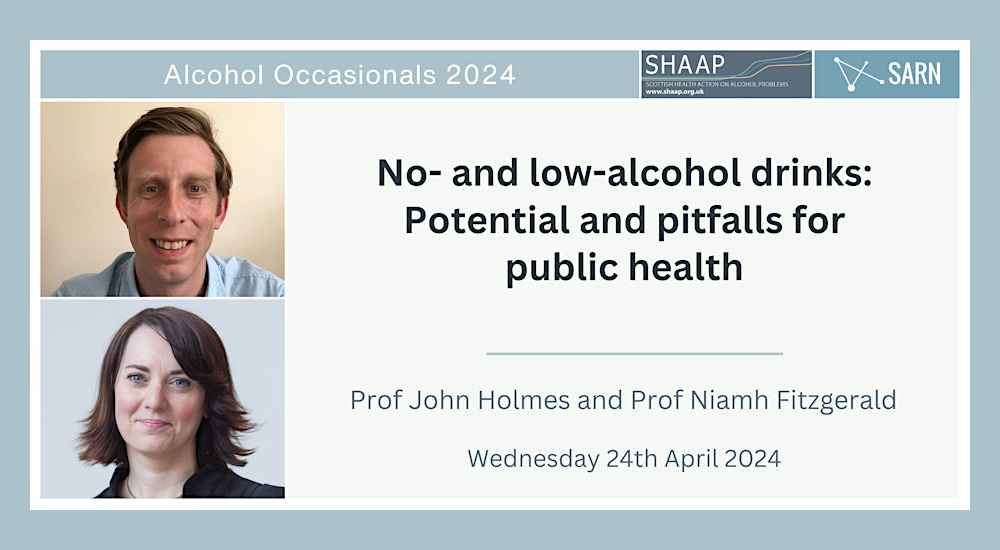John Holmes to speak on no- and low-alcohol drinks in SHAAP seminar

Prof John Holmes and Prof Niamh Fitzgerald will discuss the implications of no- and low-alcohol products for public health in a free online seminar on 24 April.
The seminar forms part of the 'Alcohol Occasionals' series organised by Scottish Health Action on Alcohol Problems (SHAAP) and the Scottish Alcohol Research Network (SARN).
Drawing on work from the NIHR-funded project 'Evaluating and responding to the public health impact of no and low alcohol drinks: A multi-method study of a complex intervention in a complex system', John and Niamh will speak about 'No- and low-alcohol drinks: potentials and pitfalls for public health'.
About the seminar
No- and low-alcohol (no/lo) drinks have become increasingly popular with consumers in recent years and the UK Government is committed to growing the no/lo market. No/lo drinks may have substantial health benefits if used in place of standard alcoholic drinks, but public health actors are concerned about risks including surrogate marketing, policy substitution and harmful effects on vulnerable groups.
During the seminar John and Niamh will discuss the pathways to benefits or risks for public health arising from the rise in no/lo drinks in the UK; present new quantitative data on trends and social patterns in sales, purchasing and consumption of no/lo drinks; and argue for a unified public health response to no/lo drinks.
About the speakers
John Holmes is Professor of Alcohol Policy at the University of Sheffield and Director of the Sheffield Addictions Research Group. He is also co-Director of the NIHR Policy Research Unit in Addictions.
Niamh Fitzgerald is a Professor of Alcohol Policy and Director of the Institute for Social Marketing and Health at University of Stirling. She is also Deputy Director of the SPECTRUM (Shaping public health policies to reduce inequalities and harm) research consortium (2019-2024), with responsibility for impact, knowledge exchange and public engagement.
Registration
The seminar will take place online on Wednesday 24 April 2024, 12:45pm – 2pm. Visit Eventbrite to register for free.
-
New research shows that spending less on tobacco, gambling and sweets is good for the UK economy
A new study from the Sheffield Addictions Research Group (SARG) has found that public health policies which reduce spending on harmful products can actually provide a significant boost to UK jobs and the wider economy.
-
SARG researcher Dr Parvati Perman-Howe secures NIHR Career Development Award
We are delighted to announce that Dr Parvati Perman-Howe, a Research Associate within the Sheffield Addictions Research Group (SARG), has secured a highly sought-after Career Development Award.
-
Professor John Holmes contributes to major new report outlining actions to tackle alcohol harm
SARG Director Professor John Holmes was part of an expert panel that supported the development of 'A Healthier Future: A long-term vision to tackle alcohol harm in the UK', a significant new report published by the Institute of Alcohol Studies (IAS) this week.
-
SARG researchers present on economic modelling and wastewater surveillance at European Public Health Conference
Two researchers from the Sheffield Addictions Research Group (SARG), Dr Charlotte Head and Dr Esther Chanakira, will showcase innovative local-level tools for policy design, including economic modelling and wastewater surveillance, at the European Public Health (EPH) Conference in Helsinki from 11–14 November 2025.
You might also be interested in…
-
SARG Heads to Glasgow for 50th Anniversary KBS Symposium
A team of twenty researchers and PhD students from the Sheffield Addictions Research Group (SARG) will be participating in the landmark 50th Anniversary KBS Symposium for Social and Epidemiological Research on Alcohol next month.
-
SARG team highlights alcohol and gambling research at the Festival of Social Science
The Sheffield Addictions Research Group (SARG) recently took part in the ESRC Festival of Social Science by hosting an interactive activity stand in Sheffield's Moor Market.
-
Young people's consumption of no/low alcohol drinks in family settings
This project explores young people's consumption of no/low alcohol drinks in Great Britain, focusing on family settings. Using surveys and interviews, it will investigate adult perceptions, consumption trends, and the relationship between no/low and alcohol use among young people.
